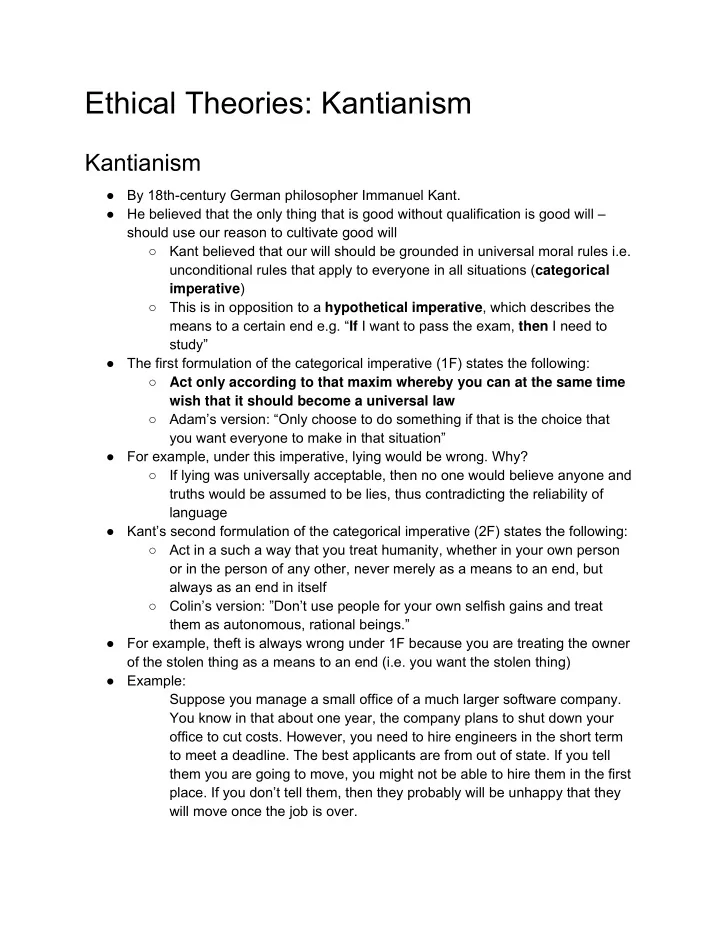

Ethical Theories: Kantianism Kantianism ● By 18th-century German philosopher Immanuel Kant. ● He believed that the only thing that is good without qualification is good will – should use our reason to cultivate good will ○ Kant believed that our will should be grounded in universal moral rules i.e. unconditional rules that apply to everyone in all situations ( categorical imperative ) ○ This is in opposition to a hypothetical imperative , which describes the means to a certain end e.g. “ If I want to pass the exam, then I need to study” ● The first formulation of the categorical imperative (1F) states the following: ○ Act only according to that maxim whereby you can at the same time wish that it should become a universal law ○ Adam’s version: “Only choose to do something if that is the choice that you want everyone to make in that situation” ● For example, under this imperative, lying would be wrong. Why? ○ If lying was universally acceptable, then no one would believe anyone and truths would be assumed to be lies, thus contradicting the reliability of language ● Kant’s second formulation of the categorical imperative (2F) states the following: ○ Act in a such a way that you treat humanity, whether in your own person or in the person of any other, never merely as a means to an end, but always as an end in itself ○ Colin’s version: ”Don’t use people for your own selfish gains and treat them as autonomous, rational beings.” ● For example, theft is always wrong under 1F because you are treating the owner of the stolen thing as a means to an end (i.e. you want the stolen thing) ● Example: Suppose you manage a small office of a much larger software company. You know in that about one year, the company plans to shut down your office to cut costs. However, you need to hire engineers in the short term to meet a deadline. The best applicants are from out of state. If you tell them you are going to move, you might not be able to hire them in the first place. If you don’t tell them, then they probably will be unhappy that they will move once the job is over.
Under 2F, you should disclose the company’s plans to the job applicants otherwise you are treating them as a means to an end Thus, under Kantian ethics, we must ask ourselves two questions: o Can I rationally wish that everyone act as I propose to act? o Does my action respect the people involved rather than using them for my own purposes? Kantian ethics are deoontoligical (or non-consequentialist) ethics – they judge an action based on properties intrinsic to the action itself, rather than the outcomes or consequences of the action From Kant’s perspective, motivation is extremely important in determining a person’s moral worth (ie. Whether a person is morally praiseworthy or morally blameworthy) Kant argued that one can have moral worth only if they are motivated by morality For example, being generous to feel good about oneself is not morally worthy according to Kant. Instead, being generous because it is one’s duty is how one earns a moral worth. What are some of the strengths of Kantianism: o Takes motivation into account o Ascribes morality even though you don’t know what the consequences will be (don’t have to omniscient) o It treats all people as equal o It gives all people moral worth by considering them as rational, autonomous beings o It holds everyone to the same ethical standard What are some of the weaknesses of Kantianism: o No flexibility or bending of the rules But could add situational maxims? The more complicated the rule, the more difficult it is to understand and apply o Sometimes no single ethical rule completely captures a situation o Can come up with scenarios that lead to no meaningful answer or an obviously wrong answer o Motivation is subjective sometimes o Ignores the consequences (unlike utilitarianism) o Which rule takes precedence?
o Kantian ethics criticized for being an idealized version of what should be done in perfect world rather than what is actually done in the real world
Recommend
More recommend